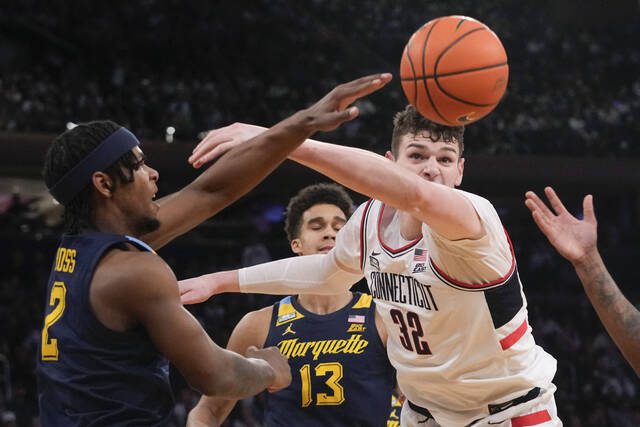Before the brackets were revealed on Sunday, March Madness was very chaotic.
The most certain thing was UConn.
The defending champion Huskies got the top seed in the NCAA Tournament, along with Houston, Purdue, and North Carolina as No. 1 seeds in a bracket that was already unpredictable before the pairings were announced on Sunday evening.
Among those top teams, only UConn enters the tournament after a win. The others lost in their conference tournaments, but that wasn't the only surprise over the final weekend before the main event.
Unexpected champions like Oregon, North Carolina State, and even Duquesne, who were not expected to make the tournament, qualified through the automatic bid for conference champions. The teams they defeated took up some of the 34 at-large bids, reducing the spots available for teams on the bubble.
Charles McClelland, the chairman of the selection committee, described the process as one of the most difficult that they have experienced. The committee was working until 2:30 a.m. the night before. Some long-time staff members said it was the most challenging selection process they had ever been part of.
This was evident in a bracket filled with puzzling decisions:
• Two of the last four teams chosen — Boise State and Colorado State — were not even considered as bubble teams by most bracketologists.
“I'm a little surprised, to be honest,” said Boise State coach Leon Rice about his team's No. 10 seed.
• Some teams that were not selected — St. John’s and Oklahoma — were believed to be safe choices as of Saturday. St. John’s even chose not to participate in the NIT.
“How did St. John’s end up so far from the cutoff?” questioned UConn coach Dan Hurley, who was also surprised that only three Big East teams made it.
• Florida Atlantic and Texas A&M were considered bubble teams but ended up with 8 and 9 seeds, respectively.
This could support the ongoing discussion about expanding the bracket to 76 or even 80 teams. In that case, bubble teams like Pittsburgh, Seton Hall, and Indiana State would almost certainly make it.
The tournament begins on Tuesday with two First Four games, which includes a matchup between Virginia and Colorado State. The 32 first-round games will be held on Thursday and Friday. The Final Four will take place on April 6-8 in Glendale, Arizona.
UCONN THE FAVORITE
UConn, who will face Stetson on Friday, is the favorite according to FanDuel Sportsbook and is aiming to become the first repeat champion since Florida in 2006-07. The Huskies have a seven-game win streak and are tied with James Madison for the most wins in the nation.
Despite their impressive performance this season, UConn ended up in the East region with two of last year’s Final Four teams (San Diego State and Florida Atlantic) and Iowa State, which was briefly considered for a top seed after a 69-41 win over Houston.
Hurley said that if they can figure out who they are as a team and play with more intensity than their opponents, they can avoid being vulnerable.
CONFERENCE BRAGGING RIGHTS
The SEC and Big 12 each had eight teams in the tournament, while the Big Ten and Mountain West had six teams each.
Michigan State extended its streak by making it to the tournament for the 26th consecutive year. They are the ninth seed and will face Mississippi State, while Gonzaga, which was once in danger of not making it, secured a spot for the 25th year in a row with a string of wins.
INJURY WORRIES
Kansas, dealing with injuries, is the 4th seed and will play against Samford. Both Hunter Dickinson and Kevin McCullar Jr. sat out the Big 12 Tournament opener, which led to a 20-point loss for the Jayhawks.
Florida, seeded 7th, will face the winner of the Boise State-Colorado play-in game. However, they suffered a setback when their player, Micah Handlogten, broke his leg during the SEC title game.
SMALL FRY
The Ivy League’s Yale, seeded 13th, had to make a late comeback and hit a buzzer-beater against Brown to secure their spot in the tournament. Saint Peter's, who made a surprising run to the Elite Eight two years ago, is back as the 15th seed and will play against Tennessee.
If Tennessee moves on, coach Rick Barnes could potentially face his former team, No. 7 Texas. Texas will play the winner of the Virginia-Colorado State match.
Duquesne, the unexpected winner of the Atlantic-10, is back in the tournament after 45 years and will face No. 6 BYU.
JOB SECURITY
In 1999, Dan Monson and Mark Few guided Gonzaga to the Elite Eight. Monson now coaches Long Beach State and was recently let go, but his team's Big West victory earned them a spot in the tournament.
Monson mentioned that Mark Few suggested having a successful run in the first and last year of coaching.



